Swan-song of the living dead duck
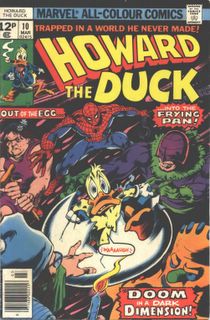
Howard the Duck #10
It may sound like a funny animal story, but it's not. Howard the Duck is a satire. The closest equivalent I can think of is Jonathan Swift's Gulliver's Travels. In it, Swift, hilarious, malicious and savagely ironic, portrays the journey of the eponymous hero through various realms, the most famous being Lilliput, where he is a giant. You can read it as an adventure story (I loved it as a child), but Gulliver is really travelling through Swift's England, mutated to appear as it might to a stranger.
In Howard the Duck, Steve Gerber takes the opposite approach. Howard is a duck involuntarily transported into a land of humans (or "hairless apes", as Howard would say). Swift has our traveller in foreign worlds, while Gerber has a foreigner in ours, but the intent is the same. Both poke their own world as mercilessly as they can manage.
Most importantly, you have to realise that Howard is not really a duck. Bill Mantlo (Gerber's successor) and the movie never said anything much more than, "Look! He's a duck! That's really, really funny!" But Howard's fowlness is only feather deep - eloquent, cynical, affectionate, outraged and sentimental, he is perhaps the most three dimensional person comics ever produced. This is in contrast with the people he meets, who are often grotesques or caricatures, serving primarily to show the absurdity of our world. Or sometimes just to tell jokes...
The title, "Swan-song of the living dead duck", is of course Gerber poking fun at himself, his "Song-cry of the living dead man". I can count at least three different word plays in this title. Which, when I think about it, is just showing off. The story itself is a rewrite of "Song-cry", and demonstrates how much Gerber had developed in just two or three years. It also illustrates how great writers work: if they fail to realise a story properly, they figure out why and then come back and have another go.
The purpose of the two stories is identical: the struggle of a rebellious soul to cope with bourgeois living. In "Song-cry", Brian Lazarus is never more than a cardboard cut-out tormented soul, so weak it is difficult not to feel contemptuous (you want to yell, "Get a grip on yourself"). But Howard, on the other hand, is an established, self-reliant character. His brush with mental illness is bound to be more affecting than Lazarus'.
The book starts with Howard emerging from his egg:
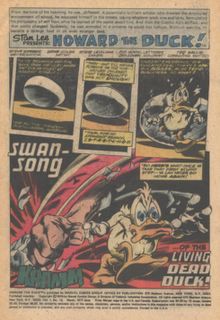
Note "Ted Sallis, consulting schizo" at the top. Ted Sallis is the scientist who became the Man-Thing. As for Howard, how can you not fall for someone with this way of describing their own birth?
Howard: Emergence! Big clucking deal! There I was in a bigger, more tepid blackness. So what?
Gerber now develops his theme, which is alienation. In "Song-cry", Lazarus was assailed by his own demons. Howard, though, is going to give us a lecture.
Howard: Now watch closely, kids. You're about to observe the process of socialization in action...mostly it's simple indoctrination, see? You're educated - largely informally, but nonetheless effectively - in a body of customs, mores, taboos. You learn not to yell 'Fire' in a crowded theatre - not to go 'Hubba-Hubba' at pictures of Eleanor Roosevelt - and most of all - you learn there's certain places you're supposed to tread lightly. One thing about indoctrination: some of us just don't take to it naturally.
And then we have this page:
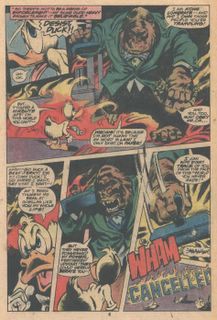
"Kong Lomerate" - Gerber has a love of silly names (you wonder if Stan Lee ever realised Gerber had introduced a property developer called F.A. Schist). With the "CANCELLED" stamp, this is one of those rare moments when a story pulls back and says, "look, this is just a comic book." Used sparsely, as here, this is a good device, though it can do your head in.
Howard: Over time, of course, and after a succession of feather's-breadth escapes from the system, the strain begins to tell. In some, it evinces itself as anger, in others as self-doubt. For me, it was an overwhelming sadness...and utter apathy toward the very business of living. Outwardly, I'm sure it looked like cynicism - but a cynic's just a fallen idealist, right? Just a poor slob looking for any morsel of info that'll motivate him again.
This is Brian Lazarus through and through, but put much more deftly and sadly.
Howard then meets his girlfriend, Beverly.
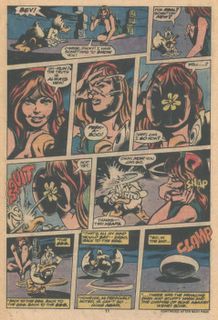
Seeing a weary Howard traipsing back to the egg still makes me laugh out loud. But this is a troubling image: withdrawal from the world is a symptom of clinical depression.
Realising he's having a nightmare, Howard now meets Spider-Man.
Spider-Man: Listen, I brought you a present! Bury your beak in this, fella. If somebody'd given me a copy, I wouldn't be the wall-crawling mass of guilt I am today.
Howard: What is it - "Adam Bede" or "The Idiot"?
Spider-Man: Neither exactly.
Spider-Man gives Howard a copy of "When I say no I feel guilty - a guide to assertive behavior"
Howard: Aw, gwan, beat it! The last thing I need now is pop psychology, even if the title is germane to my situation.
Gerber, incidentally, writes Spider-Man dialogue better than a couple of dozen Spider-Man writers I could name.
Now Howard meets up with the equivalent of Lazarus' subconscious manifestations, some of his previous encounters:
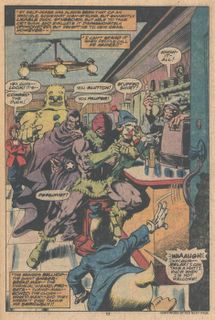
This is so much more subtle than in "Song-cry": Lazarus was pulled apart by his demons, while Howard's are being mildly rude about him - "they weren't even taking me seriously".
Howard now moves on to discuss with Dr Strange (they were in Gerber's Defenders together) his problems with cultural conditioning and playing the role of hero - again echoing Lazarus' concerns. Then, following an attack by his arch-enemy, the Kidney Lady, Howard comes face to face with Canadian supervillain Le Beaver - "the only fight I'd ever walked out on - 'cause it was just too ludicrous", Howard plummets from Niagara Falls all the way down to hell, where his enemies await him. "I just hope I'm still dreaming - 'cause if this is for real, I'm going to get very depressed." And so it ends.
It's easy to review a bad comic. You point out its flaws, make some jokes and maybe some mildly unflattering comments about its author. But what do you say about a comic so good that it still enthralls you over twenty years after you first read it? In these years, Gerber was a writer absolutely at the top of his game, creating stories which could have come from nowhere but his head. And I know I tend to forget about artists, but this was Gene Colan at his most beautiful. There's a meme going around about putting your five favourite writers and artists together. I'm not even being slightly facetious when I say that it's already happened. Steve Gerber and Gene the Dean.
Was Howard the Duck the best comic ever? There are too many different comic genres for that to be a meaningful title, but...maybe.



2 Comments:
I can count at least three different word plays in this title. Which, when I think about it, is just showing off.
Don't stop "showing off," D.C.! This is one of your best posts ever--maybe the best, and that's saying something because I love what you're doing on this site. Just as I'm completely ignorant of Man-Thing, I've also never read Howard, but the first thing I'm going to buy next week is Marvel's Essential Howard the Duck collection. Clearly I've missed out on something truly wonderful.
Your reading of this story as a re-write of "Song-Cry" is great comics criticism because it points to something fundamental about how we can approach a single writer's work: a process of constant revision and development of certain ideas. This is true of novelists too of course, but it can arguably be more experimental and achieve far greater complexity than the work of most novelists because of the sheer number of stories most comic writers are able to produce in a shorter time. (I see a similarly intense process of rewriting and working through of a particular theme going on in Geoff Johns's work, that I find incredibly moving...but that's a subject for another day.) Thanks for the marvelous essay.
Gosh, Jim, say any more nice things I might start blushing...
I really meant that Gerber was showing off, but, come to think of it, I probably am too.
You've never read Howard? For some reason, I automatically think that everyone has read it, but the truth is, it's thirty years old and discredited by association with the abominations published in its name after Gerber left. Everyone should read it, although a good few do so and think, "What was that all about?".
Post a Comment
<< Home